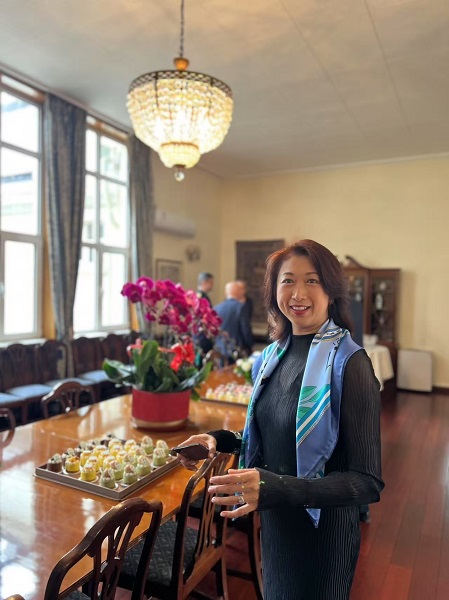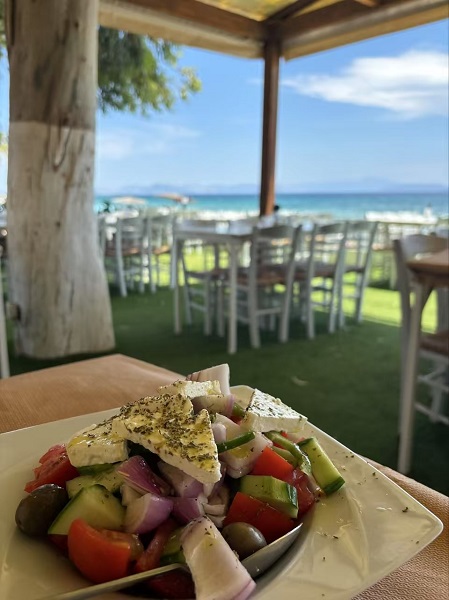Greek cuisine and culture comes alive in an east-meets-west culinary journey cookbook by the wife of the Greek Ambassador to China.
“The stomach is the quickest path to a person’s heart.” This sentiment has long echoed across cultures worldwide. Throughout history, food and feasting have played pivotal roles in many significant moments – whether as icebreakers, celebrations or as symbols of mending fences. This has evolved and given rise to the contemporary term “gastronomic diplomacy,” signaling that ingredients, cooking methods, and eating habits are all now, more than ever, important attributes of a nation’s character and identity.

Xu Li
Xu Li, wife of the Greek Ambassador to China Dr. Evgenios Kalpyris, is closely associated with both diplomacy and cuisine. On the official social media accounts of the Greek Embassy in Beijing, one often finds videos of this Chinese-born ambassador’s wife preparing Greek dishes: Bakaliaros (cod fritters), Vasilopita (New Year’s cake), and more – offering Chinese audiences a window into Greek culinary culture.
Recently, she published a book, From Grandma’s Kitchen to the World’s Table, which vividly introduces readers to the varieties, characteristics, and techniques of Greek cuisine, along with its social customs, drawn from her personal experiences. Interesting family anecdotes are woven throughout the book, making it an engaging read that inspires affection not only for Greek food but also for the people and culture involved.
No wonder Du Qiwen, former Chinese Ambassador to Greece, praised the book as being “filled with the beauty and warmth of everyday life.” By sharing family stories and emphasizing the values of “sharing,” “inheritance,” “fusion,” and “innovation” in her culinary journey, Xu strikes a deep emotional chord with readers.
“High-quality ingredients, simple cooking, and a culture of sharing reflect the inclusive, generous, and confident character of the Greek people,” Xu shared in an exclusive interview with China Today. “When it comes to Greece, Chinese people might be familiar with ancient Greek history, including the Olympic Games. But other aspects are less known. Food offers a very direct way to understand Greece.”
The English word “gastronomy” actually originates from ancient Greek. The Greek cook and author Mithaecus (c. 5th century BC) is credited with writing one of the world’s earliest cookbooks, known as Opsopoeia or The Art of Cooking – a testament to the long history of Greek culinary culture. The ancient Greek epics Iliad and Odyssey, well-known to Chinese readers, contain vivid depictions of feasting and food, with grilled meat remaining a favorite among Greeks to this day.
Open, Hospitable, and Inclusive Greek Food Culture
Greek cuisine blends local flavors with influences from North Africa, Asia Minor, and other regions, showcasing a distinct openness.
The first chapter of the book introduces “mezes,” quintessential Greek appetizers that embody the spirit of Mediterranean dining: fresh, simple, diverse, and seasonal. As Xu explains, mezes refer to a collection of small dishes meant for sharing, including both hot and cold options. A rich variety of mezes can serve as appetizers before a main course or stand alone as a full meal.
The book details the types of mezes, the occasions for enjoying them, pairing suggestions, and seasonal variations. It also describes the ambiance of traditional Greek meze restaurants – simply or traditionally decorated, “relaxed and joyful, free from rigid conventions.” Scenes of the sea, beach, breeze, and sunset often form the unique backdrop of coastal or rural meze tavernas, where diners gather in small casual groups, enjoying distinctive Greek dishes – a true reflection of Greek hospitality.

An afternoon tea featuring mezes
Xu also shares family recipes passed down from her Greek mother-in-law: kolokithokeftedes (Greek zucchini fritters with feta), spanakopita (spinach pie), tiropitakia (Greek cheese pie), melitzanosalata (eggplant salad), and tzatziki (yogurt cucumber dip) among many others. Each recipe comes with ingredient lists, step-by-step instructions, and practical tips, such as how to store pastry and use leftover ingredients.
Xu adeptly incorporates scenes from her life as a diplomat’s wife, hosting brunches and afternoon teas with mezes, and adds spice to the book through personal family stories and diplomatic anecdotes. The book is enriched with numerous homemade food photos and family pictures, making it warm and relatable.
Additionally, the author introduces several Michelin-starred restaurants in Greece, highlighting their unique settings, signature dishes, and cultural features, sparking wanderlust in readers. This makes the book not only a practical guide for food enthusiasts but also a culinary map for travelers.
Unique Geography Shapes Distinctive Eating Tradition
The Mediterranean diet has been repeatedly named the “healthiest diet” by various media outlets. Numerous studies show that Southern Europeans not only enjoy longer average lifespans but also significantly lower rates of cardiovascular disease.
Xu summarizes the essence of this diet in her book: “Minimal cooking, plenty of vegetables, plant-based proteins instead of red meat, a wide variety of ingredients, saying ‘no’ to excess salt and ‘yes’ to abundant herbs and spices.” She even includes a shopping list.
Greece’s diverse geography – encompassing sea, mountains, plains, and islands – gives rise to unique local products. The chapters “Vegetables and Legumes” and “Seafood” particularly highlight the distinct qualities of Greek ingredients.

Greek Salad
As Xu notes, Greek soil is rich in minerals, and many farmers still prefer traditional growing methods with minimal use of fertilizers and pesticides. This organic approach preserves the natural flavor of vegetables. Greeks enjoy vegetables in straightforward ways: raw in salads, or boiled and dressed with lemon and olive oil, or lightly stewed.
“Greek restaurants focus primarily on ingredient quality, only with simple preparation or cooking. Sauces are different from those in Chinese cuisine, which sometimes emphasize complex sauces. For Greeks, the ultimate dipping sauce is always a blend of olive oil and lemon juice,” Xu told China Today.
In the chapter on vegetables and legumes, the author introduces readers to Greek morning markets, where fresh organic produce can be found, along with recipes for classic Greek vegetable dishes. Greek salad is clearly her favorite – a simple combination of tomatoes, feta cheese, olive oil and other plant ingredients, which is easy to prepare, refreshing, and nutritious. As a mother of three, these are likely reasons why Xu loves it so much. This chapter also highlights “fakes” (lentil soup), a staple in Greek households, interspersed with stories of her children growing up and her own journey to loving this dish, leaving a lasting impression on readers. The background about her “long-handled wooden spoon” used by her mother-in-law, carrying memories of three generations, along with insights into Greek family life, adds charm and interest.
Surrounded by sea on three sides with a long coastline and numerous islands, Greece is rich in seafood. The high salinity and mineral content of the Aegean Sea give Greek seafood its unique taste. In the “Seafood” chapter, Xu shares easy-to-follow recipes such as “sphyrida sto alati” (sea salt-baked sea bass), “octopus pasta,” and “crispy fried atherina” (fried fresh whitebait). Particularly noteworthy is “kakavia,” or fisherman’s soup – a hearty broth made from a variety of small fish caught during the day and simmered with vegetables. The types of fish vary by season and the day’s catch, but freshness is always key. Through an account of sharing kakavia with local fishermen on a boat trip with her husband, she emphasizes the Greek philosophy of life: freedom and sharing.
Culture and Inheritance
Chapters like “Meat Lovers,” “Baking,” and “Greek Festivals and Food” best capture the essence of Greek culture and social customs. Xu notes that meals in Greece are always family-oriented. “Dining is not just about taste,” she writes, “but also an emotional bond that ties families together.” It’s common for Greeks to say during gatherings, “In my hometown, we make this dish like this…” – a reflection of unique family traditions. Xu’s own Greek recipes come from her mother-in-law.

Vasilopita, the Greek New Year’s Cake. Photos courtesy of Xu Li
In the chapter on meat dishes, she relates family gatherings centered around mothers and grandmothers, where everyone – adults and children alike – helps set the table, serve food, and pour wine, all while chatting and enjoying the meal. She also recounts a 2002 trip to Koufonisia Island, where the owners of a guesthouse treated them with delicious food and warm hospitality – and refused payment – vividly illustrating Greek generosity.
Signature dishes featured include pastitsio (beef pasta bake), moussaka (eggplant casserole), roasted lamb leg, and Rolo hirino (pork loin rolls with bell pepper and cheese) among others. Xu also touches on the concept of “mother’s cooking” and shares tender moments of family life.
No matter where they are, the taste of home remains a constant comfort. To better suit Chinese palates, Xu has adapted some of her mother-in-law’s recipes, such as Kotopita (chicken pie). She also shares a fun experience about tasting exceptionally tasty Greek chicken pie in South Africa, further piquing readers’ curiosity.
Participating in local festivals is the best way to understand Greek culture. Xu describes Greek New Year’s Eve, where children sing carols in the streets clanging angle iron, and bakery owners give away freshly baked sweet treats. The highlight of festive foods is the New Year’s cake, vasilopita, which contains hidden coins. The lucky finders receive blessings and small gifts – a tradition reminiscent of coins hidden in Chinese New Year dumplings.
The book also highlights “table art.” Artworks collected by Xu and her family from around the world adorn their dining table. Particularly noteworthy is a Chinese Jun porcelain ware brush washer bowl used as a centerpiece – filled with water and scattered petals, it exudes “elegance and warmth.” At diplomatic dinners, she often engages guests by asking them to guess the original purpose of this porcelain piece, enlivening the atmosphere while sharing Chinese craftsmanship.
By the end of the book, readers are left with a strong sense of the author’s passion for life. This is not just a practical Greek cookbook but a heartfelt work that blends food culture with the stories of a diplomatic family. As Dr. Evgenios Kalpyris notes in the foreword: “This book opens a pleasant and interesting path for the encounter of two civilizations (China and Greece). Trust me, the ‘scenery’ along this path is magnificent.”